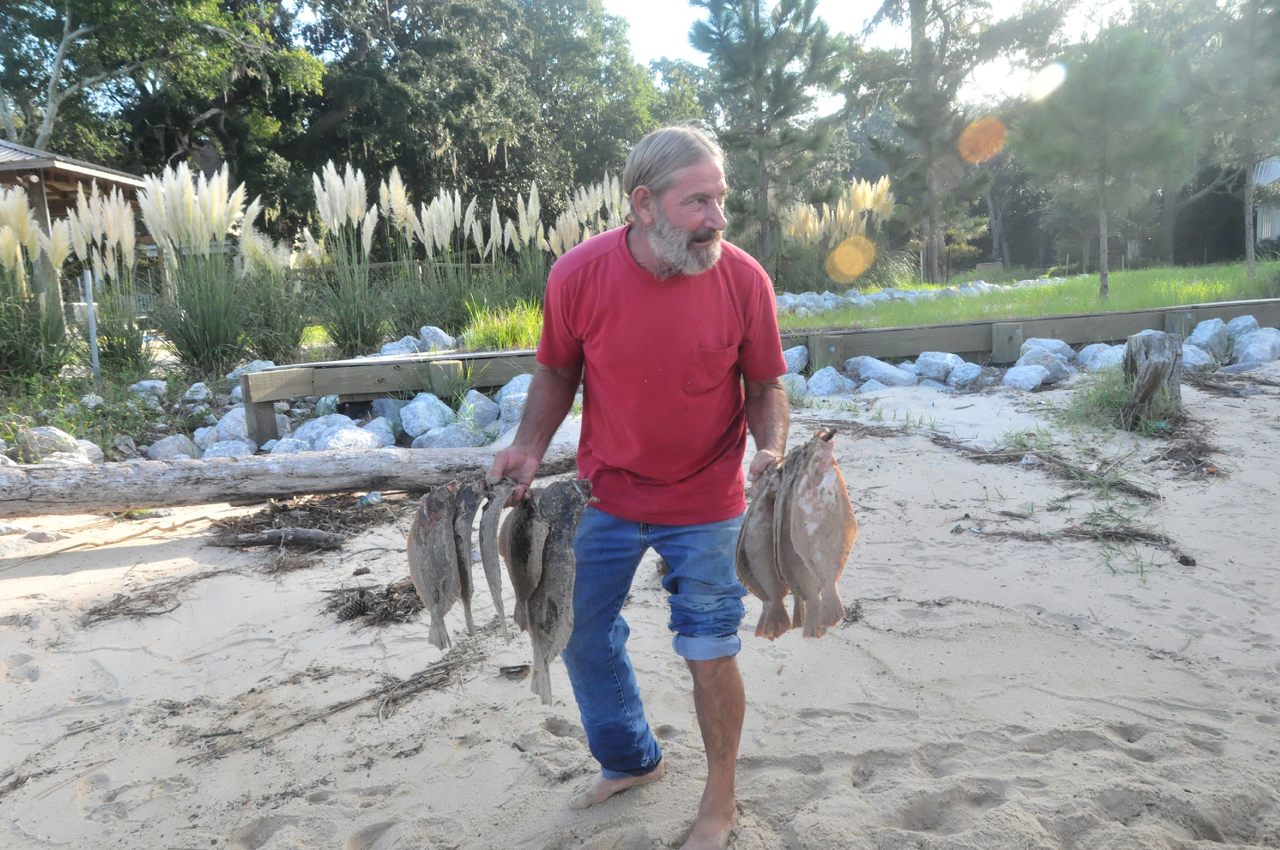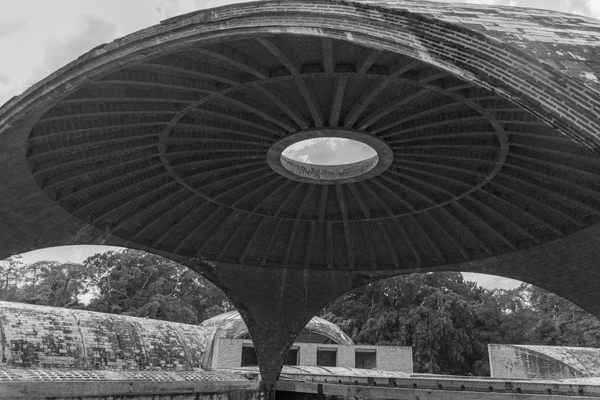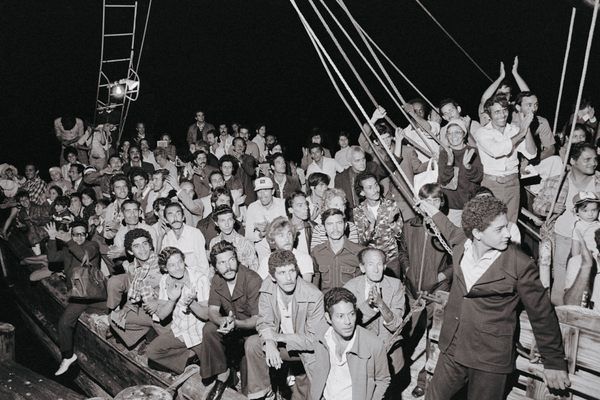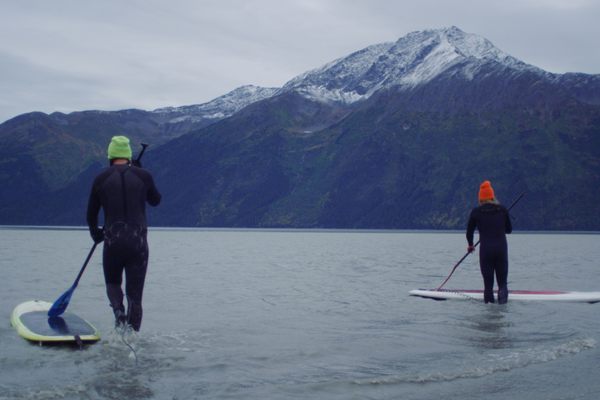The Mysterious Bounty of Mobile Bay’s Midnight Jubilees
On this stretch of coast, fish unpredictably flock ashore, providing a windfall of seafood.
The estuary, marshes, and swamps of Alabama’s Mobile-Tensaw Delta are full of wonders, including hundreds of bird, reptile, fish, and mammal species. Its natural beauty is a reliable source of pleasure and plenty for its residents and visitors. But on a few sultry mornings each summer, during a full moon, locals spring from their beds in response to news of a wondrous natural phenomenon occurring on a spot along a 15-mile stretch of coast. Catfish, shrimp, and flounder rise from Mobile Bay’s floor and swarm at the water’s edge, eels shimmy onto the sand, and crabs flee the water, scaling barnacled docks and tree trunks. This exodus of sea life provides residents with as much seafood as they can gig, net, or scoop. Inspired by the celebratory atmosphere it brings in its wake, they call it a jubilee.
Alabama authors including Winston Groom (Forrest Gump) and Daniel Wallace (Big Fish) create characters and scenes that leave readers wondering where truth alchemizes into fantasy. Listening to recollections of jubilees feels like sitting at an uncle’s feet, listening to a story being spun as lightning bugs spark the night. Locals including Jimbo Meador, a delta guide who’s benefited from jubilees for almost 80 years (knowing about one before him is considered bragging rights) recently lured me in with tales that seemed apocryphal. Skiffs full of flounder? Shrimp scooped out of the water by the bushel basket?
“It’s like people who say they saw Bigfoot,” says bayfront resident Watt Key, author of Alabama Moon, “you don’t talk about jubilees that much to outsiders—they don’t believe you.”

I first heard about jubilees in 2014 when I stopped in Point Clear, on the eastern coast of Mobile Bay, while researching a book on recipes and tales from the Southern coasts. Back then, Texas Sea Grant marine biologist Tony Reisinger, whose mother hailed from Mobile, explained the science of jubilees to me.
“Estuaries have a dense saltwater wedge that slips like a long tongue reaching from the ocean’s side underneath fresher, less dense bay water,” he said. “Sometimes that dense, deeper water, which is oxygen deprived from decaying organic matter, is pushed onto the shallow eastern shelf of the bay by tide-driven water. That can force bottom-dwelling marine life to seek refuge along the eastern shallows—they scramble for air at the surface and as close to land as possible, causing a jubilee.”
But jubilees can’t be predicted, Reisinger added. The weather, tide, and moon cycle can all be right, but no jubilee appears. Folks in Point Clear chuckle about film crews from Time Magazine, CNN, National Geographic, and other outlets coming to town over the years, trying but failing to document it.

Jubilees may seem seasoned by legend, but they’re as real as the bay water they’re borne from, occurring multiple times every summer between June and mid September. Residents say they feel them coming, like northerners can tell when snow will fall. They tailgate after midnight at the dock when signs suggest one might manifest. Jubilees are part of Point Clear’s DNA.
The accounts I heard went something like this: You look for the signs and symptoms. Jubilees roll in after a full-moon midnight on hot summer evenings following a day with light showers. When both an easterly wind and rising tide push at the shore (but no boat or ship wakes disturb the water), bottom dwellers rise up in the small hours and head to the beach, gasping for air. The procession begins with eels slithering onto, then burrowing down into, the sand, writhing like a giant Medusa head. Hogchokers float to the surface, and catfish gather at the bay’s edge. Next, groups of fish poke above the surface to gulp air. Crabs claw their way up pylons, and shrimp crowd the brackish water in a tangle of antennae and legs, followed by flounder and stingrays, all slowed by a lack of oxygen. Soon birds start squawking and feasting on the buffet. Next comes the bell ringing along bayfront lawns to alert neighbors, who groggily spill out of their screened doorways, hair askew, armed with “go kits” of gigs, nets, and baskets. Boys get the thrill of spying what the girls sleep in—no one bothers to change from their pajamas to gig fish.
The jubilee rush begins—a quietly competitive event. It can deliver such a wealth of free food that men head to the hospital later than they should when their wives are in labor. The scaling, shelling, and steaming of the fish, shrimp, and crabs goes on toward noon. Local schools and businesses forgive jubilee delays, and everyone prays a thunderstorm won’t knock out the electricity and spoil the spoils in their freezers. Some grill crab-stuffed flounder for breakfast; others feast on a fresh pot of gumbo that evening.

Back in the ‘50s, Meador’s parents moved their kids, chickens, and milking cow to the shore each summer. A few times during those months, Meador would hear scratching on the screen door of the sleeping porch where he and his sisters camped out. That was his friend Duke’s signal that a jubilee was happening; he’d leap out of bed, and they’d head to the beach to fill wooden skiffs with as much as their four hands could haul in. Since they sold their catch for pocket money, they worked silently to avoid alerting any competition.
During lean years, when residents are too focused on feeding their families to lose precious time, they might act like Duke and Meador. But it’s more common to spread the word. Early in Point Clear’s history, people rang house bells posted along the shore and hollered to their neighbors. This was before homes were shut up tight with air conditioning. In more recent decades, Watt Key says, “Families had a call list … a piece of scratch paper next to the phone with names to contact if there was a jubilee.” Feelings got hurt if you didn’t call—Key’s dad was once called a “one-flounder friend” because he didn’t call a neighbor quickly enough and the man only caught one fish. Today, people text or call from their cell phones right from the beach.
In August, I decided to try my luck and drove from the Georgia coast to Point Clear when I saw that the last full moon of the summer coincided with a rising, post-midnight tide. I knew the chances of catching a jubilee were infinitesimal, but it’s a lovely place, and I thought the anticipation alone might be fun.

On the evening of the full moon, I stayed up all night, leaving my bayfront room at the Grand Hotel every couple hours to look at the moonlight on the water, trying to divine what was happening below. A promising easterly wind rustled Spanish moss on a craggy live oak. A lone heron stared into the shallows, searching for signs of life along with me. A little after 5 a.m., I got the calls from Key and Meador: “It’s happening.” I grabbed my camera and drove to Key’s house—they’d warned me jubilees can be fickle about where they stay, and for how long.
It felt like a paper-bound fable was blossoming into life. Each of the harbingers appeared: Key pointed out small eels moving toward shore and floating hogchokers with his flounder light. With a big yellow moon painting the water, groups of gasping fish appeared, with just the tips of their mouths breaking the surface in a posture locals call “smoking.” A crab sought refuge on a felled tree. Then, flounder appeared, and a young family friend, also new to jubilees, climbed down the bulkhead, gig in hand, and speared her first fish.

Key urged me to hustle down the bay a few miles to a tried-and-true jubilee spot. Three pickup trucks were already parked; lone fishermen peered into the water, dripping nets and gigs in hands, with floating plastic tubs trailing them for the shrimp and crabs they’d caught. Hundreds of catfish swarmed in the gently lapping water, just as I’d heard they would. But I had no idea they’d be bitty, only three inches or so, and would undulate back and forth with the swishing water, their thousands of white whiskers against their blue-gray bodies making them appear more like spiders with linked legs. Spade fish, mullet, and stingrays joined the party too.
As the sun came up, pelicans and gulls swooped in for their breakfasts. Hearing that they’d do so is nothing like seeing the rising sun light up their white feathers, and the splashes from their dive bombing for fish. One man sneaked up on and victoriously gigged a flounder that had eluded him several times. There are catch limits on flounder and shrimp, but during jubilees, no one polices the numbers or minds private property lines.

Over my travels to more than 100 islands in the United States, I’ve seen or heard about many strange things on beaches, including Ice Age arrowheads revealed by the Chesapeake Bay’s waters on Smith Island, voodoo dolls with spells sewn inside their bellies floating ashore at Deerfield Beach, North Carolina, and “square grouper” (jettisoned bales of marijuana) landing on the Florida Keys. They all pale in comparison to what I experienced at Point Clear. Witnessing the jubilee felt like winning the lottery—there are plenty of people who’ve lived on the bay for decades without seeing one. A local asked if I’d accompany him to a casino, given that I had the power to “summon a jubilee on a whim.” The luck might have come courtesy of my rental car’s license plate, which started with the letters “GIG.”
I wonder, in the days before scientists helped explain them, what people thought caused jubilees—how they believed they’d pleased their deity enough to deserve the providence. Long ago, the bay communities in the area couldn’t have known that this doesn’t happen anywhere else in the western hemisphere, and nowhere else as often. I reckon they simply thought, as Jimbo Meador said about my miraculous experience, that they were blessed.
Gastro Obscura covers the world’s most wondrous food and drink.
Sign up for our regular newsletter.












































Follow us on Twitter to get the latest on the world's hidden wonders.
Like us on Facebook to get the latest on the world's hidden wonders.
Follow us on Twitter Like us on Facebook